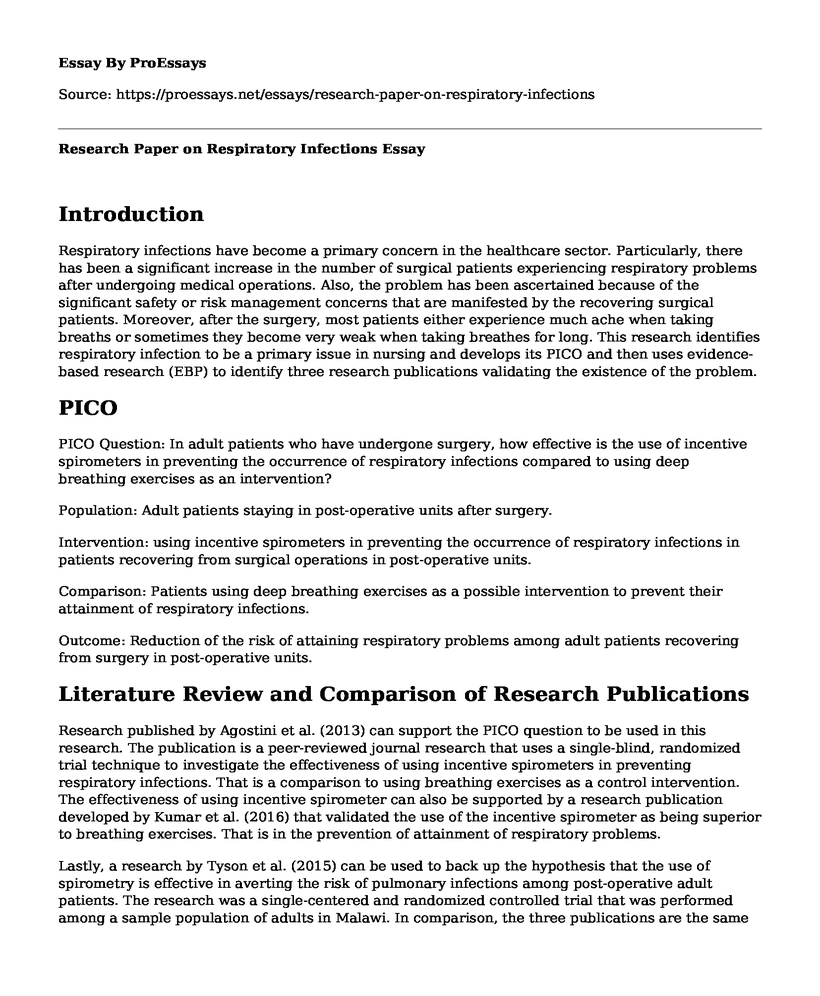Introduction
Respiratory infections have become a primary concern in the healthcare sector. Particularly, there has been a significant increase in the number of surgical patients experiencing respiratory problems after undergoing medical operations. Also, the problem has been ascertained because of the significant safety or risk management concerns that are manifested by the recovering surgical patients. Moreover, after the surgery, most patients either experience much ache when taking breaths or sometimes they become very weak when taking breathes for long. This research identifies respiratory infection to be a primary issue in nursing and develops its PICO and then uses evidence-based research (EBP) to identify three research publications validating the existence of the problem.
PICO
PICO Question: In adult patients who have undergone surgery, how effective is the use of incentive spirometers in preventing the occurrence of respiratory infections compared to using deep breathing exercises as an intervention?
Population: Adult patients staying in post-operative units after surgery.
Intervention: using incentive spirometers in preventing the occurrence of respiratory infections in patients recovering from surgical operations in post-operative units.
Comparison: Patients using deep breathing exercises as a possible intervention to prevent their attainment of respiratory infections.
Outcome: Reduction of the risk of attaining respiratory problems among adult patients recovering from surgery in post-operative units.
Literature Review and Comparison of Research Publications
Research published by Agostini et al. (2013) can support the PICO question to be used in this research. The publication is a peer-reviewed journal research that uses a single-blind, randomized trial technique to investigate the effectiveness of using incentive spirometers in preventing respiratory infections. That is a comparison to using breathing exercises as a control intervention. The effectiveness of using incentive spirometer can also be supported by a research publication developed by Kumar et al. (2016) that validated the use of the incentive spirometer as being superior to breathing exercises. That is in the prevention of attainment of respiratory problems.
Lastly, a research by Tyson et al. (2015) can be used to back up the hypothesis that the use of spirometry is effective in averting the risk of pulmonary infections among post-operative adult patients. The research was a single-centered and randomized controlled trial that was performed among a sample population of adults in Malawi. In comparison, the three publications are the same in reference to supporting the effectiveness of using incentive spirometers to minimize the risk of developing respiratory infections among adult patients. Also, in all the three experiments, breathing exercises were used as a control tool in validating the effectiveness of spirometry as a respiratory infection control intervention.
Conclusion
In conclusion, respiratory infections have become a primary concern in the healthcare sector and they are highly prevalent among adult populations who are recovering after undergoing through a surgical operation. The elevated risk of developing respiratory problems among surgery patients is caused by poor safety and risk management measures employed by healthcare professionals in a clinical setting. Ultimately, although breathing exercises can also be employed as a possible intervention, they are not as effective as the use of incentive spirometry in preventing respiratory infections.
References
Agostini, P., Naidu, B., Cieslik, H., Steyn, R., Rajesh, P. B., Bishay, E.... Singh, S. (2013). Effectiveness of incentive spirometry in patients following thoracotomy and lung resection including those at high risk for developing pulmonary complications. Thorax, 68(6), 580-585. http://dx.doi.org/10.1136/thoraxjnl-2012-202785
Kumar, A., Alaparthi, G. K., Augustine, A. J., Pazhyaottayil, Z. C., Ramakrishna, A., & Krishnakumar, S. K. (2016). Comparison of flow and volume incentive spirometry on pulmonary function and exercise tolerance in open abdominal surgery: A randomized clinical trial. Journal of Clinical and Diagnostic Research, 10(1), 1-6. http://dx.doi.org/10.7860/jcdr/2016/16164.7064
Tyson, A. F., Kendig, C. E., Mabedi, C., Cairns, B. A., & Charles, A. G. (2015). The effect of incentive spirometry on postoperative pulmonary function following laparotomy: A randomized clinical trial. JAMA Surgery, 150(3), 229-236. doi:10.1001/jamasurg.2014.1846
Cite this page
Research Paper on Respiratory Infections . (2022, Jul 21). Retrieved from https://proessays.net/essays/research-paper-on-respiratory-infections
If you are the original author of this essay and no longer wish to have it published on the ProEssays website, please click below to request its removal:
- Personal Statement for CRNA Program
- Development of New Drugs for Multiple Sclerosis Therapy in Patients With Walking Disability
- King`s Conceptual System Theory Essay Example
- Nutritional Communication and Human Services Essay
- Research Paper on Polio Eradication Initiative
- Essay Example on Population Health Analysis & Hunger in Upper Darby
- Paper Example on Understanding Williams Syndrome: Causes, Symptoms & Treatment







